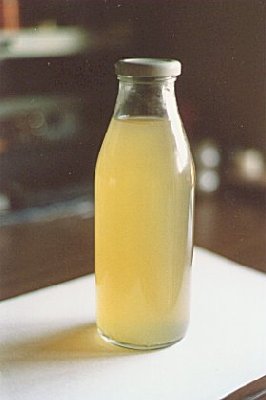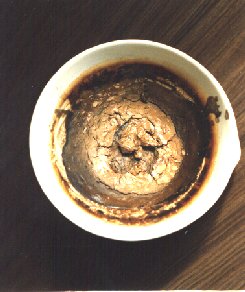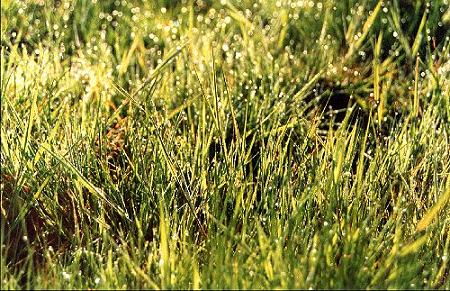The Dew - Part I
The dew or celestial water is the nocturnal
atmosphere condensation under the influence of the Moo, and, according to the alchemical
tradition, it is the privileged vehicle of universal spirit. The old alchemists beheld the
celestial water with great appreciation. In the countries of central Europe, they
recommended that one collect the dew in the months of March, April, and May, because in
those months it holds a very special virtue as it is impregnated with the universal
spirit.
In the center and south of our country
(Portugal), the best weather to collect the dew occurs in the months of March and April.
In years of little rainfall in the spring, in the month of May, the herbs of the
grasslands to dry thus hindering the condensation of dew. Besides being so little in
quantity as to not justify the spent effort; the dew collected in these conditions is
dirty. We have had the occasion of verifying this personally.
At times, in his books, our Masters makes
reference to the celestial water (dew) as an analogy for when there is a condensation of
vapors in a vase or in a distillation.
We saw an Iberian alchemist, who is very much
known in your country for the books he wrote about "your" alchemical work, when
the corner of his lips twitched as we talked of the application of the dew in alchemy. He
demonstrated in this way an ignorance of the alchemical reality.
If you ask one "those" alchemists how
the dew in collected and distilled and its salt are extracted, certainly they won't know
how to answer you because that knowledge is not within their reach. It is in rare books
where this operation is described. We learn it in Solazaref's books.
In our Art, this water is usually used as a
vehicle in the treatment of philosophical salts and other things.
The dew condensation is made during the night,
closer to dawn. So that there is an abundant condensation, it is necessary that the sky is
clear, cloudless, and that there are not winds or breezes, that is, in a calm night.
The suitable time to collected the dew, as we
said, is in the spring during the first quarter to full moon.
There are few nights that offer the ideal
conditions for collecting the dew. You will have to watch and take advantage of them when
possible.
To collect the celestial water you will need a
medium size cotton towel preferable very used, a 10 litter iron enameled basin, some 5
litre large glass bottles very well washed with water, a big plastic funnel and a very
clean fine cloth to serve as filter.
On the previous day, inspect the field where you
will do your collecting. Watch for the best access road and other landmarks that will
allow you to easily identify.
Choose a clean field, without pollution, with
short herbs (brasses), with a maximum of height and away from urban areas.
Get up two hours before dawn but before you go to
the place, verify the dew by looking at the roofs of cars parked on the street in an open
place away from the building. Look to see if the cars are covered with condensation. If
they are that is a good sign. If there is no condensation on the cars, it is needless to
leave your house because there is no dew. Please take our advice because we know it well
owing to our own experience.
If there is abundant condensation, move to the
chosen place carrying all your material. The towel should previously be washed in
rainwater or spring water.
When you arrive to the chosen place, unfold the
towel and spread it on the ground at the edge of the field. Attach a thin rope on the two
tips for dragging it over the grass.
Drag the extended towel slowly so the towel will
absorb the celestial water that is on the grass. When you begin suggest you pay attention
to the towel's weigh because when see that it saturated, stop and thoroughly squeeze it
into the basin.
The dew, at this time of the year, is at lower
temperature than the air; about 5 degrees plus or minus (in my country) so, for that
reason, your hands will be very cold.
Continue in the some way dragging the towel and
when it is saturated again stop and squeeze it into the basin until it is full. Now, take
a 5-litre large bottle and put the funnel into it. Use a cloth for a filter and drain the
liquid into the bottle.
Don't forget to take a flashlight because, as we
told you, dew collecting should be done before dawn and sunrise.
Continue until the first rays of the dawn begin
to appear on the horizon then stop. Collect your dew and equipment and return to your
house. In one night, in good conditions, you will be able collect more than 10 litres of
celestial water.
The collected dew is lightly yellowish colour of
the tea and it is scentless.

The first time we observed it we thought this
colour was owed to the dust that was in the grass where it had been collected. For
confirming it the next night, when the sunbeams began to appear on the horizon and there
was good visibility, with a very clean sponge we carefully collect the dew deposited on
plants that were very clean and without any pollution. The colour was exactly the same.
Once you arrive at your house, while still in
darkness, pour the liquid from the 5 litre large bottles though a funnel with the filter
cloth into 20-litre large glass bottles in the basement sheltered from the light.
If it is possible for you, that is, if you live
in the country, on full moon nights, pour the dew in a big plastic basin and leave it
exposed to the moonbeam during the night. I will absorb the universal spirit and increase
its virtue. Collect in before sunrise.
Fill at least a 20-litre large glass bottle, or
more according to your needs, and let it stand still in the basement 5 litres of dew into
5-litre bottle. Do this operation at night while using a small flashlight.
During this time the dew putrefies and, after
that, all the matter that was in suspension will rest on the bottom leaving a limpid and
transparent liquid.
Pour 5 litre of (clear) dew into a 6-litre
cucurbit like the one that is used to distil the spirit of wine and vinegar. Then attach
the still head and a 2-litre recipient and distil in a moderate fire not above 60°C. It
will take more than one week to distil everything depending on the size opening at the
neck of the cucurbit. You must not forget that this operation is to be made in darkness.
Keep the distilled dew in 20 litre glass large bottles, within the shelter of the light.

After everything is distilled, there will be
dregs in the bottom of cucurbit that you will pick up and save.
Distil all of the dew in the same way and always
save the dregs. After you have distilled 40 litres of dew, pour all the dregs in the
cucurbit and distil to dryness. Remove the caput and calcine it in a mud or stainless
steel porringer on a gas stove with very strong fire. Extract the salt by leaching with
the distilled dew. You will obtain some 20 or 30g of salt.
This dew salt, still raw in the alchemical point
of view, contains subtle nitre that after being properly prepared, as Art demands, is used
in the canonical dry way.
The collection and distillation of dew is a true
Herculean work that requires much patience and perseverance. As we already told you in the
beginning, it may not always be possible, even in favourable times, to collect the dew
that you will need due to adverse weather conditions, such as rain, overcast sky, or wind,
etc.
The distilled dew will be very useful in the
preparation of the several canonical salts inherent to our Art.
For certain common operations, you can use
instead of the distilled dew, rainwater (very clean and filtered), collected in the
spring, preferable on thunderstorm days.
Field to collect the dew:
 >
>
Rubellus Petrinus
@nifo@innergarden.org
Inner Garden Foundation
P.O. Box 8520, 3542AD
Utrecht, The Netherlands